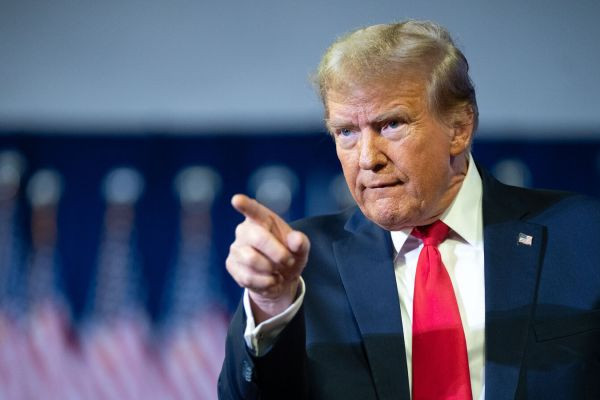Former President Donald Trump has never been one to shy away from bold declarations, and his post-debate performance in the 2024 Republican presidential primary was no different. Following the debate, Trump publicly expressed satisfaction with his performance, touting it as a win that solidified his lead in the GOP race. However, behind the scenes, several of his closest allies and advisors reportedly felt differently. They questioned whether his performance truly helped his campaign or, more troubling, whether it did more harm than good.
Trump's Confidence Post-Debate
Following the debate, Trump made a series of statements claiming victory. On his social media platform, Truth Social, he wrote, “I had a fantastic debate! Everyone is saying I dominated the stage and left no doubt who is the frontrunner.” In typical Trump fashion, he dismissed his rivals as weak and ineffective, suggesting they could not stand up to his strong presence and track record as a former president.
Trump's public persona has long thrived on projecting confidence, and this debate was no exception. From his viewpoint, his performance reflected his grasp of policy issues, his ability to hit back against critics, and his status as the most formidable figure in the GOP. His supporters, at least the most vocal ones, appeared to rally around his statements, emphasizing his dominance and experience compared to the rest of the field.

What Happened During the Debate?
The debate itself was a high-stakes affair, as the GOP contenders faced off over key policy issues such as immigration, healthcare, and the economy. Trump’s presence on stage was overwhelming, as he frequently interrupted his opponents and used his signature rhetoric to dismiss their points. For his base, this performance likely reinforced his reputation as a fighter who stands up for what he believes in.
However, Trump also found himself embroiled in several heated exchanges that could have alienated key voting blocs. His remarks on healthcare, for instance, were criticized as lacking detail and policy substance. When pressed about the rising costs of prescription drugs, Trump pivoted to his broader critique of the current administration rather than outlining a specific plan to address the issue. His rivals took advantage of this, pointing out that the former president failed to provide solutions during his term and seemed to be doing the same in this campaign.
Furthermore, Trump’s handling of questions surrounding his legal troubles was met with mixed reactions. While he dismissed the indictments as “witch hunts” orchestrated by political enemies, some viewers were left wondering how these distractions could impact his ability to focus on the nation’s most pressing issues if he were to be re-elected.
Private Concerns Among Trump’s Allies
Despite Trump’s public confidence, reports surfaced that many of his closest allies and advisors had reservations about his debate performance. According to insiders, several key members of Trump’s campaign felt that his aggressive and bombastic style, which had once served him well, may have hurt him this time. They were concerned that his failure to delve deeper into policy specifics, combined with his penchant for interrupting and talking over his opponents, might have turned off undecided voters.
One source familiar with the campaign described the debate performance as “missed opportunities.” They argued that Trump had a chance to expand his base by presenting a more thoughtful and measured approach, but instead, he leaned into the same tactics that polarized voters in the past. “There’s no doubt he still has a strong base,” the source said, “but you can’t win a general election by only appealing to your core supporters. You need to bring in the moderates, the independents, and even some Democrats. I’m not sure he did that.”
Another concern raised by Trump’s inner circle was his refusal to pivot on key issues that have become increasingly important to younger voters, such as climate change and gun control. While Trump’s base remains staunchly conservative on these topics, many advisors believe he could have softened his stance to attract a broader audience without alienating his core supporters. Instead, Trump doubled down on his dismissive rhetoric toward climate science and gun reform, potentially driving away voters who see these issues as critical to the future of the country.
Missed Opportunities for Moderation
One of the biggest criticisms from Trump’s inner circle after the debate was his failure to appear more presidential. While his tough-guy persona helped him win the 2016 election, there was a sense among some of his advisors that this time around, Trump needed to show a more nuanced and thoughtful side. Voters who are disillusioned with the Biden administration are looking for a steady hand to lead the country, and Trump’s debate performance did little to convince them that he could be that leader.
Some campaign insiders had hoped that Trump would use the debate to pivot toward a more moderate and unifying message. They believed this would help him appeal to suburban voters, women, and independents, all of whom could be crucial in a general election. However, Trump’s combative style and unwillingness to engage in substantive policy discussions left those opportunities on the table.
In particular, his dismissive attitude toward questions about healthcare, education, and social issues may have alienated some voters who are looking for solutions to the challenges facing everyday Americans. While Trump continues to enjoy strong support among his base, it remains to be seen whether his debate performance will resonate with the broader electorate.
The Question of Electability
Perhaps the most significant concern among Trump’s allies is the question of his electability. While Trump remains the clear frontrunner in the GOP primary, the general election presents a different set of challenges. His polarizing style and ongoing legal issues could make it difficult for him to win over swing voters in key battleground states.
Several advisors reportedly raised concerns about whether Trump’s strategy is sustainable in a general election. They worry that his focus on energizing his base could come at the expense of winning over undecided voters who are tired of the divisiveness and chaos of recent years. One advisor put it bluntly: “You can’t win a general election by preaching to the choir. You have to broaden your appeal, and I’m not sure he’s doing that.”
Additionally, Trump’s legal troubles are expected to continue to be a major factor in the race. With multiple indictments and investigations still ongoing, some allies fear that these distractions could prevent him from effectively campaigning or governing if he were to win. They worry that voters may view Trump as too risky a choice, especially when compared to a Democratic candidate who may be seen as more stable and less controversial.
Looking Ahead: Can Trump Adjust?
Despite the concerns expressed by his allies, Trump has shown little sign of changing his approach. He remains convinced that his debate performance was a success and that his strategy of appealing to his base will ultimately carry him to victory. However, the road to the White House is long, and Trump may need to adjust his message if he hopes to win over the broader electorate.
The former president still enjoys a significant lead in the GOP primary, and his loyal supporters remain energized. But as the race moves forward, Trump will need to address the concerns of those within his own camp who worry about his ability to win in a general election. Whether he chooses to listen to their advice and make adjustments remains to be seen.
Ultimately, Trump’s path to victory will depend on his ability to navigate the complex dynamics of the 2024 election. If he can find a way to appeal to a broader coalition of voters while maintaining the support of his base, he may once again defy the odds. However, if he continues to rely solely on his core supporters and fails to address the concerns of undecided voters, his chances of returning to the White House may be slimmer than he thinks.



